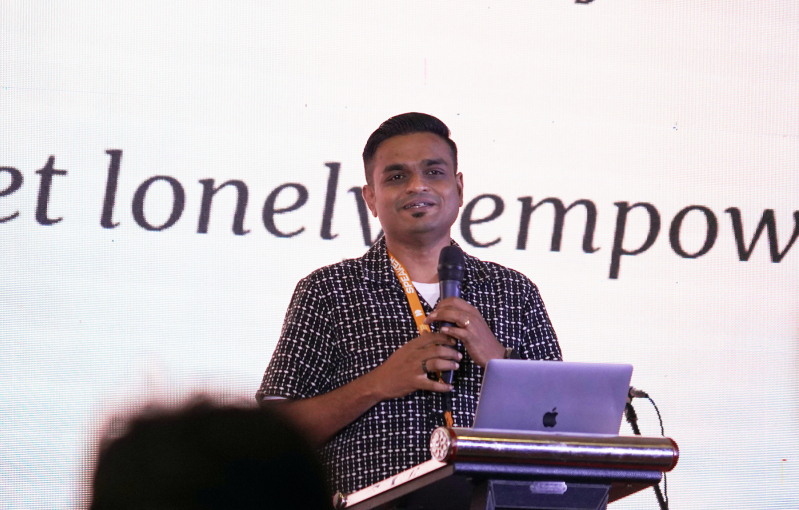
A call for authenticity, empathy, and long-term investment in the next generation of Christian leaders took center stage at the Arise Leadership Summit 2025 in Indonesia, as Ashish Hirday, Director for Church Engagement at Arise Asia and leader of the World Evangelical Alliance’s Global Youth Commission, delivered a plenary address that blended humor, data, and personal testimony with a passionate plea for a reimagined model of discipleship.
“We must come to understand Gen Z—not to label them, but to love and lead them,” said Hirday, addressing nearly 300 participants from 22 countries across Asia and beyond. “Young people are not problems to fix but disciples to form.”
The four-day summit, which concludes July 31, is hosted by Arise Asia, a mission movement mobilizing young leaders to take the gospel where it has never been heard. With a theme of “Locally rooted, globally connected – Go where there is no gospel,” the gathering features plenary sessions, workshops, worship, and intergenerational mentorship focused on raising a new generation of cross-cultural missionaries.
From “Fakebook” to real life
Opening with a light-hearted slideshow labeled his “Facebook life,” Hirday poked fun at the curated image many leaders project online. From selfies with David Platt and visits to the Billy Graham Museum to speaking engagements across Asia and the U.S., he acknowledged the disconnect between public persona and private reality.
“My prayer for all of us,” he said with a grin, “is that your life someday be as awesome as you pretend it is on Facebook.”
He then shifted tone, showing photos of his family and sharing the joys and struggles of daily life as a father of three, a church leader in Mumbai, and a youth worker who has spent two decades walking alongside young people.
“Young people don’t just want our positions or programs—they want our lives,” he said. “They want to know who we really are.”
This call for authenticity—both online and offline—set the tone for a wide-ranging address grounded in biblical principles and cross-cultural insight.
A generation worth understanding
Citing research and personal experience, Hirday described Gen Z as a generation deeply worth understanding, loving, and empowering. Globally, there are over 1.8 billion Gen Z individuals, with the largest populations concentrated in Asia, including India, China, Indonesia, and Pakistan.
“These are not the Church of tomorrow,” he said. “They are the Church of now.”
Despite being digitally connected, Gen Z is often emotionally isolated and faces complex pressures related to identity, mental health, and sexual ethics, Hirday said. He warned against both idealizing and dismissing this generation, urging leaders to move beyond stereotypes of Gen Z as “lazy, crazy, or distracted” and instead recognize their spiritual hunger and leadership potential.
“Are they disciples in the making or distractions in the room?” he asked. “We often treat them as consumers of our content, but rarely as contributors to our mission.”
Challenges facing Gen Z
Hirday went on to outline the specific cultural and spiritual challenges confronting Gen Z across Asia and globally. One of the most pressing issues, he noted, is identity confusion and sexual brokenness. Young people are increasingly asking foundational questions such as “Who am I?” and “What’s my purpose?” Many are exposed to distorted views of sexuality from an early age, leading to struggles with gender identity and widespread access to pornography.
Another major hurdle is a shift toward pragmatism over idealism. Even when Gen Z expresses a willingness to serve in missions, they often ask, “Who will support me?” Financial insecurity and future uncertainty contribute to a risk-averse mindset, especially when compared to previous generations.
Cultural changes are also rapidly reshaping values. Hirday cited a study from one Southeast Asian nation in which a large portion of Christian Gen Z respondents indicated that they viewed same-sex relationships as acceptable, reflecting a shift of moral perspectives even within conservative religious contexts.
Finally, he pointed to spiritual uncertainty as a deep concern. While many young people profess faith early in life, they often lack intentional discipleship and community support, leaving them spiritually adrift or stagnant in their growth.
“We must stop reacting and start anticipating,” Hirday said. “Young people today are facing battles we never imagined—but they are also open to truth when it is lived out authentically.”
Mentorship: Beyond events and titles
Rather than prescribing quick fixes or programmatic solutions, Hirday offered a vision of mentorship that is incarnational, long-term, and rooted in spiritual maturity.
“Young people are not looking for polished leaders,” he said. “They’re looking for real ones—leaders who will walk with them in their doubts and failures, not just applaud their successes.”
Hirday contrasted event-based youth ministry with relational investment, criticizing models that emphasize large gatherings over meaningful connection. He called on churches to open their lives to younger believers, not just their platforms.
“Jesus didn’t do discipleship at Starbucks,” he said. “He invited people into his life. That’s what young people want—proximity, not perfection.”
He also warned against treating young people as ministry “projects,” emphasizing that they are “God’s workmanship” and the best equipped to reach their own generation.
The need to risk and release
Drawing on Jesus’ own example, Hirday challenged leaders to take risks on “messy young people,” recalling how the disciples themselves were far from perfect.
“If Peter came to your office for an internship, would you hire him?” he asked. “Jesus risked his mission on people like that. Are we willing to do the same?”
He shared his own story of being given a chance by a mentor when he had little money, limited English skills, and no platform—just a passion to serve youth.
“There was a person who took a risk on me,” he said, referring to a senior leader who supported his studies. “Ten years ago, nobody knew me. But someone believed in me. And that changed everything.”
Such investment, Hirday said, is not only transformative for individuals but essential for the future of the Church.
From best practices to “next practices”
Hirday proposed a strategic shift from relying solely on established “best practices” to embracing “next practices”—a more flexible, Spirit-led approach tailored to engage a new generation in fresh, relevant ways. This shift, he argued, must be rooted in a deep understanding of today’s youth and a willingness to innovate in discipleship and mission.
He stressed that generational research should not be viewed as an academic exercise but as a missionary imperative. “We don’t study Gen Z to critique them,” he said. “We study them to serve them.” This perspective calls for a discipleship model that is not isolated but cooperative, grounded in partnership across multiple spheres of influence.
Hirday emphasized that effective discipleship depends on the combined efforts of the local church, parents, and mentors.
The Church, he said, remains central to spiritual formation, reminding listeners that “Jesus died for the Church, not an NGO.” Its role is irreplaceable in grounding young believers in biblical truth and communal worship. Parents, especially in Asian cultures, continue to wield significant influence in their children’s lives and must model a lifestyle of faith and mission at home. Mentors, meanwhile, are called to walk closely with young people—not just dispensing advice or content, but offering authentic relationships that guide and shape their spiritual journey.
“Together,” Hirday concluded, “we can raise and release a missionary generation.”
A caution and a calling
As the session drew to a close, Hirday offered a dual word of caution and calling to mission leaders, pastors, and mobilizers.
“Mobilization without the Church is biblical and theological disobedience,” he said, stressing the need for integration between mission agencies, local churches, and families.
And while the temptation is to label or lecture younger generations, he urged instead a posture of humility and presence.
“Let us come to understand Gen Z,” he concluded, “not to fix them—but to walk with them. Not to shame them—but to shepherd them. And not to keep them waiting—but to release them to the world that God so loves.”






